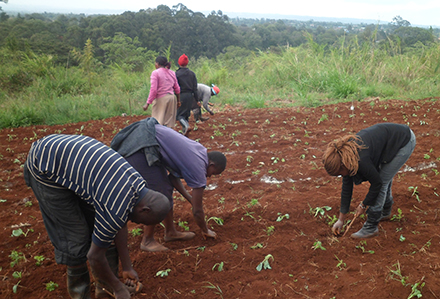Effect of legume integration and application of organic fertilizers on soil nutrient stats and kale yield
Caroline Chepkoech, Msc, Kenya
Kale production in parts of Kabete sub-county in Kenya has been on the decline. There is need for improving the production potential which is majorly hindered by low soil fertility. The study was done to evaluate the effects of using farm yard and Minjingu rock phosphate with legume integration in a kale cropping system on soil nutrients, kale nutrient concentrations and yield. The legumes used here were chickpea and lupin, as part of the research the amount of nitrogen fixed by the legumes was determined and the decomposition rates of the legumes were evaluated.
I chose this study so as to address some of the challenges faced by the small holder farmers producing kale. I find this subject interesting because the use of legume is a new technology being introduced to the farmers producing kales as most are used to kale mono-cropping systems.
Another interesting part of the study was the determination of nitrogen fixed by the legumes under the different cropping system and organic inputs combination. Where farmers adopted the use of the legumes, they would either burn or apply them haphazardly on the farms after harvesting. Thus an evaluation was needed to determine the right time to incorporate the legumes into the soil to match the kale nutrient uptake. When the exact times have been known, it would help in avoiding nutrient loss and thus reduce the demand for farm fertilization, reduce the cost of production is and have farmers livelihoods improved. After conducting the research, I found that the use of legumes with organic fertilizers improved the soil fertility status, kale nutrient concentrations and yields. The amount of nitrogen fixed by the legumes was also high where organic inputs was applied and in the legumes/kale intercrops. Also, the exact time of legume incorporation in the soil was also discovered.
This study is important as it was able to portray that the use of organic inputs is a cheaper alternative to the expensive inorganic fertilizers. Soil fertility status, kale nutrient concentrations and yield were improved with these technologies adopted. Further study is needed on the kale nutrient concentration, as much as it was analyzed the nutritive contents was left out. Thus I would recommend a study to be done on the nutritive value of organically produced kale.
Several actors in this sector would benefit from the results of this study. Farmers will benefit as they will gain more knowledge on how to harvest more products as they will be able to have both spatial and temporal harvestings. The input suppliers will benefit as they have evidence that the products they are selling are beneficial to the organic farmers. The organic consumers will benefit from the study as they will be made aware that organic products have high nutrient concentrations.
The research gap related to this topic is declining soil fertility and the cost of the fertilizers which most small holder farmers cannot afford. To address this issue, priority should be given to using of the organic fertilizers with legume integration to improve soil nutrient status which will translate to improved kale nutrient concentration and yield.
More about the project

Caroline Chepkoech, MSc.
University of Nairobi, Kenya.
Enrolment date: March 2014
Main Supervisors: R. Onwonga & R. Wahome
External supervisor: H. H. Jensen
Caroline Chepkoech graduated in December 2015.
Contact
Caroline Chepkoech (carochepkoech@gmail.com)

